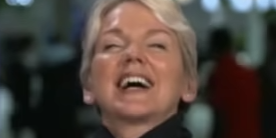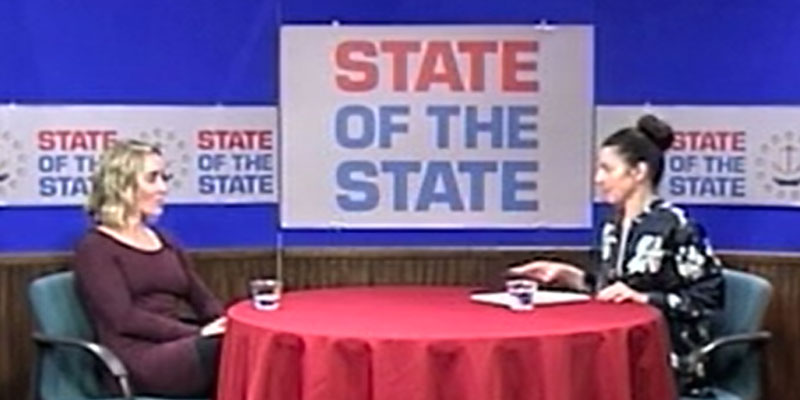Parents, don’t be surprised if you’re ambushed with enthusiasm for vaccination during the car ride home after picking up your child from a school hosting a COVID-19 vaccination clinic for children from five to 11 years old. The Rhode Island Department of Health (DOH) is handing out toys — fidget spinners, to be exact — to young vaccine recipients.
Laura Damon reports for the Newport Daily News that the “fidget spinner toy [indicates] COVID vaccination status” at Gaudet Middle School, and Anchor Rising has confirmed with a source at a different school that the government is providing them for all state-run clinics.
The free gift is something of a surprise. Neither the press release announcing the availability of the vaccine for young children nor the Department of Health’s vaccination page mentions the prizes.
In fact, a spokesperson for the department disputed this characterization. Asked whether the DOH had publicly announced the program, the spokesperson told Anchor Rising that only one clinic was giving out the fidget spinners “as a distraction while getting vaccinated,” which “resulted in inaccurate rumors on social media.”
Somebody should warn the children, because they’re taking the freebies as desirable bribes for vaccination and may feel left out when other children show them off at recess. More worryingly, parents who aren’t yet convinced it’s a good idea to vaccinate young children — who already have a 99.92% chance of avoiding hospitalization with COVID in Rhode Island — have reason to fear that fidget spinners will not be the last way in which their kids are manipulated and treated differently.
[Open full post]If you’re wondering why the topic of free condoms in schools is appearing in headlines and social media conversations today, it might be because “Vermont just became the first state in the nation to give access to free condoms in grades 7-12,” as Hank Berrien reports for the Daily Wire.
It’s actually a bit more extreme than that. The state legislature has mandated that all public secondary schools, which appears to cover students down to seventh grade, must make condoms freely available to students.
The interesting part, though, is that the birth control is apparently going to be donated by Planned Parenthood. Why would the private organization do that? Well, because it’s good for their abortion business. It’s product placement for sex.
The more schools remind children to want to have sex, and the more they make available implements that make children feel as if they ought to be using those implements, the more sex children will have, which means the more mistakes they’ll make, which means the more babies Planned Parenthood can kill.
[Open full post]On WNRI 1380 AM/95.1 FM, John DePetro and Justin Katz discuss:
- McKee’s (more than) missteps with ILO
- North Kingstown’s missteps with naked fat tests
- Potential missteps in the RI GOP’s gubernatorial plans
- RI government creates yet another PR job
Featured image by Jonny Gios on Unsplash.
[Open full post]There really aren’t that many people in prison at the moment over the events of January 6, so when stories of their mistreatment continue to arise, it kinda raises questions, you know?
It also makes one question the explanations. Last week, several of them had to be removed from their cells on stretchers after exposure to chemical sprays, and the story, according to Zachary Stieber of The Epoch Times, is that one inmate wouldn’t wear a mask. As the guards attempted to subdue him with the spray, they kept missing, and the air circulation system distributed the gas into the other inmates’ cells, where they were trapped because the only person with a key had left the area.
Stories like this seem like they might justify a little more attention and might even start reinforcing the sense that the term “political prisoner” isn’t exactly without justification.
[Open full post]Of course Katie Mulvaney would fail to include a single expression of contrary concern about a survey finding (surprise, surprise) that many identity groups involved with the Rhode Island judiciary believe they have suffered from discrimination there in her Providence Journal article. Apart from journalists’ general agreement with the progressive talking points, who in Rhode Island’s political class would dare to go on the record questioning an equity survey by the RI Bar Association?
A survey by the Rhode Island Bar Association Diversity & Inclusion Task Force found that a majority of respondents encountered discrimination — including instances of racism, sexism, homophobia and prejudice based on a person’s disability — in the profession and in the Rhode Island court system. Female attorneys, lawyers of color, LGBT lawyers and those with disabilities reported experiencing barriers to their professional career, such as disparate treatment, lower pay and fewer opportunities to advance.
Even more terrifying than the notion that people are scared to speak up with a contrary view is the possibility that nobody sees how incredibly dangerous this movement is to our justice system and, therefore, our entire state. Consider the proposed solutions:
The task force has recommended that the bar association and the state Supreme Court impose mandatory annual continuing legal education courses focusing on diversity and inclusion and implicit bias. It emphasized, too, the importance of bar members in underrepresented groups participating in leadership, committees and governance.
Judges and the courts should commit to equitable hiring practices, annual implicit bias and anti-racism training, and emphasize outreach from judges to a diverse pool of lawyers, the task force said.
The activists want more than simply training judges to see things in terms of identity groups. With the introduction of “anti-racism training,” they will pressure judges to rule in ways that are unjust in a particular case in order to make up for supposed injustices on a broader social scale. This will destroy Rhode Island’s legal system.
“Equity” doesn’t mean everybody gets the same, fair treatment; it means their treatment adjusts for earlier or external considerations to ensure proportional representation and outcomes. In terms of law and order, it means that the goal of the courts would not be to ensure that the parties are treated as equals and win or lose based on the facts of the case; rather, it would be to ensure that convictions and rulings don’t disproportionately go against “underrepresented groups,” regardless of whether they are overrepresented among offenders. In terms of lawyers, it will mean that those from these groups will receive special treatment.
Even worse, the risks this movement creates are not justified by the survey, although Mulvaney’s details appear carefully selected and the full results do not appear to be available on the Bar Association’s website. Only 6% (around 300 of 5,000) of Bar members even responded to the survey, and among them, 47% claim to have “experienced discrimination.” The bias of these results is baked in: members of “underrepresented groups” were obviously much more likely to take the survey, especially those with a complaint on their minds.
Of those who identified with an “underrepresented minority group” (however many that may have been), 58% do not feel as if they have ever “experienced social, opportunity or advancement barriers,” and almost half of those (42%) who do feel that way don’t think it was their identity group status that was the cause. Never mind, by the way, that we have no way of knowing how long ago these incidents may have been. If they skew back to the 70s and 80s, the results are much less meaningful.
Nobody should doubt that Rhode Island’s legal system is shot through with cliquish insiders who enjoy being part of the club and who play by selective rules, but that affects anybody who isn’t in the club. Undermining the objectivity of the courts while infusing them with radical, racist ideas — based on the results of an incredibly skewed survey, not a rigorous examination — should be met with outrage. Is there nobody of courage and clarity left in Rhode Island’s governing elite?
Featured image by Eskay Lim on Unsplash.
[Open full post]The state Democratic Party in Rhode Island recently sent out a fundraising email saying:
We’ve got just over a year to reach and talk to as many voters as possible. We know the GOP is already doing its best to beat us up and down the ballot, and we can’t let that continue.
Are there really voters in Rhode Island who see this as an urgent threat that ought to inspire them to click a link and make a donation?
[Open full post]As you have undoubtedly noticed, the price of gasoline has risen sharply since January and heating bills are expected to jump by as much as 54% this winter.
The cause is Economics 101: inadequate supply is driving up price. In fact, one of President Biden’s senior energy advisors has acknowledged this and called on non-American producers to increase supply.
President Biden himself has repeatedly begged OPEC+ to increase supply by drilling more – most recently and incongruously, during the AGW conference in Glasgow. His pleas have been rebuffed.
But wait, the United States has lots of oil. What about that? President Biden’s Energy Secretary Jennifer Granholm was asked about that exact point on November 5 by Bloomberg media’s Tom Keene. In response, Granholm laughed uproariously at Keene’s suggestion that the US increase oil production in America, actually calling it “hilarious”. (Wonder if people steeling themselves to order heating oil find hilarity in the situation.) She went on to pretend that the United States has no oil of its own.
As you know, of course, oil is a global market. It is controlled by a cartel. That cartel is called OPEC and they made the decision yesterday that they were not going to increase beyond what they were already planning.
Hoo hah! My sides! (… this is where I laugh, right??)
Almost simultaneous with begging OPEC+ to increase production, President Biden announced that his administration would tighten the regulatory stranglehold on domestic fossil fuels, new sources (“carbon bomb” – cool) and existing. The effect of this, as he, or at least, whoever is moving his lips and pen knows, will be to strangle supply further and exacerbate the rising price of fossil fuels.
President Biden, of course, killed an American pipeline on his first day in office then, paradoxically, four months later, greenlighted a non-American pipeline.
The green in Secretary Granholm’s blazer, along with the cancelling of the XL pipeline and the intended new supply-choking regulations, is virtue-signaling by the Biden/Harris admin to environmental extremists. But don’t non-American sourced fossil fuels emit greenhouse gases just like American ones do? Does the Biden/Harris admin think the environmentalists don’t know this?
More to the point, the Biden/Harris admin clearly sees the need to increase supply to ease prices. This is the correct goal, inasmuch as the United States only generates 11% of manmade greenhouse gases (wonder if Secretary Granholm finds humor in that datapoint) so the impact of our going to zero emissions would be negligible at best, even stipulating that manmade greenhouse gases have any effect on the climate. Accordingly, I ask honestly: why do they preclude domestic drilling and fracking to accomplish this?
[Open full post]
PhD pharmacist Nadia Archambault joins host Darlene D’Arezzo to discuss the differences between marijuana and CBD, their uses, and their effects on the human condition and development. She is very candid when she shares her concerns and offers cautions about use, drug source, and more.
[Open full post]Dr. Tim Shafman on lung cancer
Dr. Stephen Skoly on the loss of medical license due to the vaccine mandate
Laurie Gaddis Barrett on the school mask mandate lawsuit
Major Wayne Morse
Featured image by the National Cancer Institute on Unsplash.
[Open full post]As he so often does, Instapundit Glenn Reynolds states briefly a key takeaway from the media and public handling of the Kyle Rittenhouse trial:
[Open full post]The goal of the left is to create an environment in which its people are encouraged to be violent without consequences, while their victims are denied the right to respond.








